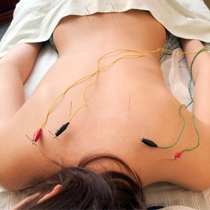
More evidence that low-calorie sweeteners are bad for your health
Studies show that artificial sweeteners can raise the risk of hypertension, metabolic syndrome, type 2 diabetes and heart disease, including stroke.

Natural Health News — New research has documented a direct connection between the use of electroacupuncture and physical processes that could alleviate sepsis, and the inflammatory disorders it triggers.
Sepsis is a severe infection that often develops in hospital intensive care units. The incidence of severe sepsis (i.e. sepsis-induced organ dysfunction) in the European Union has been estimated at 90.4 cases per 100, 000 population (by comparison the incidence of breast cancer is 58 per 100, 000 for breast cancer).
A major cause of death
In the US sepsis claims an estimated 250,000 lives every year. In the UK the figure is estimated to be up to 64,000 a year.
The anti-inflammatory drug Drotrecogin alfa (Xigris) , which was introduced in 2001, was withdrawn in 2011 due to severe adverse effects (internal bleeding) and evidence showing no efficacy in treating sepsis. Since that time there have been no FDA-approved drugs to treat sepsis.
“Sepsis is the major cause of death in the hospital,” says Luis Ulloa, an immunologist at Rutgers New Jersey Medical School who led the study, which has been published by the journal Nature Medicine.
“But in many cases patients don’t die because of the infection. They die because of the inflammatory disorder they develop after the infection. So we hoped to study how to control the inflammatory disorder.”
Reducing inflammation
The researchers already knew that stimulation of one of the body’s major nerves, the vagus nerve, triggers processes in the body that reduce inflammation, so they set out to see whether electroacupuncture – a form of acupuncture that sends a small electric current through that and other nerves – could reduce inflammation and organ injury in septic mice.
Increasing the current is said to magnify the effect of placing the needles on physiologically active points on the body. These points run along 12 pathways or energy channels, known as meridians. Each meridian is linked to a particular organ in the body, thus traditional practitioners believe that each organ can be treated by stimulating the relevant meridian. Ulloa notes that electrification is already FDA-approved for treating pain in human patients.
Ulloa and colleagues used an animal model to test their theory. When electroacupuncture was applied to vagas nerve of mice with sepsis, molecules called cytokines that help limit inflammation were stimulated as predicted, and around 50% those mice survived for at least a week.
There was zero survival among mice that did not receive acupuncture.
A closer look
Why had the acupuncture treatments succeeded?
Most human cases of sepsis include sharply reduced adrenal function (adrenal glands produce important hormones in the body); yet in animals whose adrenal glands had subsequently been removed, the electroacupuncture stopped working. So the benefits were not related to adrenal support.
Other tests showed that electroacupuncture increased levels of dopamine, a substance that has important functions within the immune system. And yet, giving the animals dopamine by itself did not curb the inflammation.
Giving the animals a drug called fenoldopam that mimics some of dopamine’s most positive effects (without acupuncture), reduced sepsis-related deaths by 40% – almost as much as the electroacupuncture treatment.
The study concluded that fenoldopalm mimics the effects of the electroacupuncture. But the opposite is also true: electroacupuncture mimics the effects of the fenoldopam to help reduce inflammation and sepsis-related deaths.
Ulloa considers the study a double triumph in that his research shows physical evidence of acupuncture’s value beyond any that has been demonstrated before. The results show potential benefits, he adds, not just for sepsis, but treating other inflammatory diseases such as rheumatoid arthritis, osteoarthritis and Crohn’s disease.
“I don’t even know whether in the future the best solution for sepsis will be electroacupuncture or some medicine that will mimic electroacupuncture,” Ulloa concludes. The bottom line, he says, is that his research has opened the door to both.

Please subscribe me to your newsletter mailing list. I have read the
privacy statement